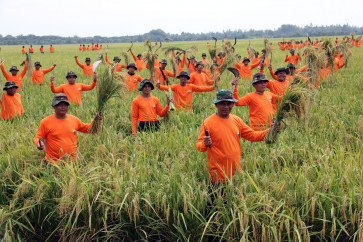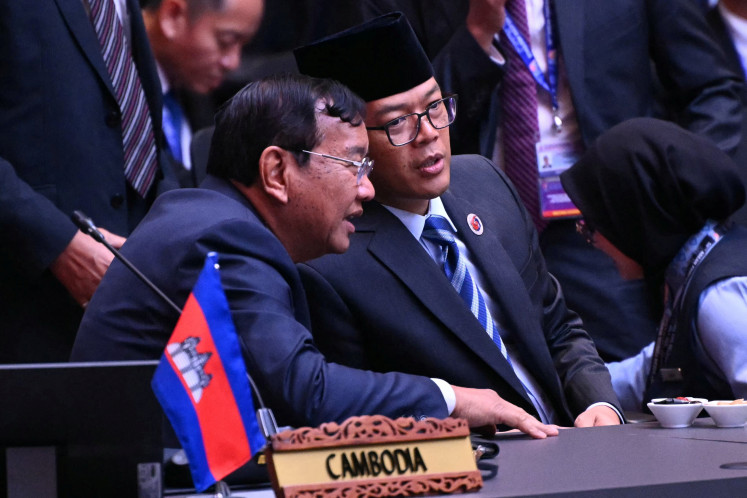Popular Reads
Top Results
Can't find what you're looking for?
View all search resultsPopular Reads
Top Results
Can't find what you're looking for?
View all search resultsBaihajar Tualeka: Ex bomb-maker who campaigns for peace
In the wide spectrum between war and peace, Baihajar Tualeka has tasted life at both extremes
Change text size
Gift Premium Articles
to Anyone
I
n the wide spectrum between war and peace, Baihajar Tualeka has tasted life at both extremes.
Years ago, during the tumultuous times of the sectarian conflict in Maluku in the late 1990s when violence broke out between Muslims and Christians in the province, Bai — as the 38-year-old Muslim is affectionately called — used to help men make Molotov cocktails and slingshots.
It was a time of perpetual confusion and turmoil. Muslim and Christian mobs fought on the streets, hurling bombs and stones at each other.
Like everybody else in Ambon during that chaotic period, Bai saw the conflict as a holy crusade in the name of religion, staunchly believing that if she died, she would have gone straight to heaven.
However, something happened that completely upended her worldview. One day, she saw a man captured by a rival mob and brutally beaten to death.
That one experience made her rethink her motivations in taking part in the conflict and to wonder what all the violence was really about and why men and women would kill each other in the name of religion.
It was contemplative thoughts like these that prompted her to change her ways. In the end, she established the Women and Children Empowerment Institute (Lappan) in Ambon in 2002 to put an end to the atrocious conflicts that she once was part of.
Since then, Lappan has conducted post-conflict recovery efforts in Maluku, focusing on education and counseling for children living in refugee camps.
Nowadays, Bai is widely recognized and applauded as one of the most active peace campaigners in Maluku. On Nov. 7, she was named the recipient of the 2012 Saparinah Sadli Award, a prestigious local award for women promoting human rights issues.
However, even after 10 years of continuous peace efforts in Maluku, Bai said that her work was far from finished.
In May, for example, violence erupted during a torch procession to honor national hero Thomas “Pattimura” Matulessy, leaving at least 51 injured and dozens of vehicles and houses burned in Ambon.
Before that, in September last year, a series of riots in the city left seven dead and 65 others injured.
The National Commission of Human Rights (Komnas HAM) later said that, based on its findings, the September riots might have been triggered by a text messages spreading rumors that a Muslim ojek (motorcyle taxi) driver has been tortured to death by a Christian family.
In reality, there was indeed an ojek driver who was seriously injured, but because of a traffic accident instead of torture.
In Bai’s eyes, these repeated acts of violence have never truly gone away from Maluku due to the absence of truly integrated peacemaking efforts from the local and central governments.
“I find it difficult to talk about whether or not Ambon is safe or Ambon is peaceful,” said Bai. “The local communities are having difficulties in finding indicators to measure peace.”
“The problem is that the Ambon administration has never learned. For them, peace efforts merely mean the physical development [of local regions] instead of an integrated effort that involves the fulfillment of the rights of refugees,” she said.
“Even in the refugee camps, there are women who become victims of discrimination and violence.”
She maintained a calm and composed manner, but there were hints of grief and sorrow in her voice.
According to her, with no integrated peacemaking efforts from the local administration, any small rumor can spread to produce city-wide tensions and full-blown conflicts, as residents have not yet fully recovered from traumatic events in the past.
“Just look at the riots in 2011. It was a simple criminal case that escalated and became a new conflict,” she said.
For Bai, the best way to campaign for peace in Ambon is to invite all the refugees to engage each other in rebuilding their shattered world, hand in hand.
One such effort was in the establishment of the multiethnical Waringin village, consisting of three Christian neighborhood units (RT) and one Muslim RT. The alleys in the village were even named after peace themes, such as Anti-Violence Alley and Awakening Alley.
Other example of Lappan’s work includes brokering various peace talks between rival Ambonese groups.
Bai’s — and Lappan’s — numerous peace efforts have not been without their obstacles. There have even been death threats. Bai, however, has not wavered. She steadfastly believes that local residents, especially mothers and daughters, have a very strategic role in encouraging peace.
“I just want to say to the youth in Maluku and everywhere in Indonesia that violence will bring you nothing. It will only bring damage to yourself and others as well. We must all strive to create a better world, a safer world, one without violence and discrimination,” she said.
“My dream for Indonesia is that we become a nation that truly respects and cherishes each other, with a government that safeguards the basic rights of everyone, especially women.”










